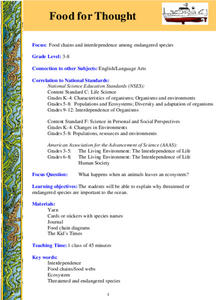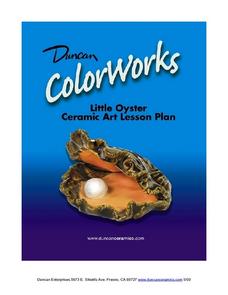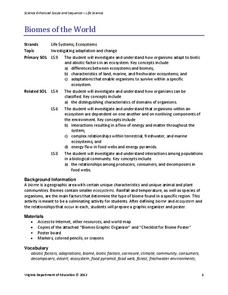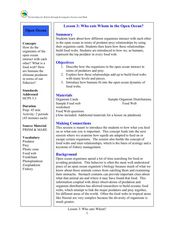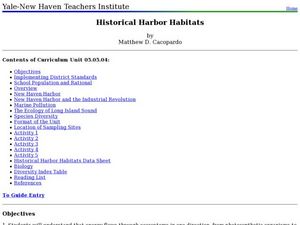Curated OER
9th Grade
Ninth graders discuss the principal source of energy entering the marine ecosystem. They name some of the autotrophs at the Maui Ocean Center. Students name some of the heterotrophs at Maui Ocean Center. They are taught that plants are...
Curated OER
Food for Thought
Young scholars explore the food chains in a variety of ecosystems and its relationship to the survival of threatened or endangered marine animals or fish in the ocean. The interdependence of the species is investigated in this lesson.
Curated OER
Little Oyster: Ceramic Lesson
Children will love researching and then creating a bottom dwelling mollusk of their own. They watch clips describing the ocean ecosystem and how oysters fit into their environment. Next, they research what oysters eat and how they look....
Virginia Department of Education
Biomes of the World
Incorporate knowledge about biomes and ecosystems in multiple ways while encouraging creativity. Emerging ecologists collaborate and perform research to complete a graphic organizer about various biomes of the world. They conclude the...
Curated OER
2005 Hidden Ocean Expedition What's Eating You?
Analyze data and make inferences about the trophic position of organisms in the Canada marine food web. After a review of the geography and formula, discuss results and write an essay to improve the understanding of Artic food webs.
Curated OER
Jelly Critters
Students compare and contrast three different organisms that are considered gelatinous zooplankton. They describe how they fit into marine food webs.
Curated OER
Shark Food
Young scholars create a linking chain to demonstrate the food chain. In this food chain lesson, students use the Internet to research sharks, including what they eat, and create a chain link with a picture of a shark. They continue...
Curated OER
The Science Behind Dolphins
Students discover facts about marine mammals, specifically dolphins. In this K-2 lesson plan, students identify the different species of Cetaceans, focusing on dolphins. Students answer true/false questions regarding cetaceans and...
Curated OER
Sea Connections
Students, after locating different marine habitats on a globe, play a card game about ecosystems, food webs and organisms.
Curated OER
Who Eats Whom in the Open Ocean?
Students examine how organisms interact with one another in the ocean. For this science lesson, students discuss predators and prey in the ocean. Students discuss food webs and how organisms interact with each other.
Curated OER
Fish Are Animals Too
Students create posters that show how a shark is a major predator in kelp forests and coral reefs after studying the food webs for these ecosystems. They determine that fish are important animals in the ocean's web of life.
Curated OER
Blue Planet: Open Ocean
Students research facts about animal species. In this ocean instructional activity students view a video, prepare illustrated cards and create a food-web display.
Curated OER
Oceans and Coasts
Students explore the topic of marine pollution. They define key vocabulary words, list examples of marine pollution, complete a true/false handout, read an article, and participate in a class discussion.
Curated OER
Empty Oceans
In groups of four, pupils brainstorm about seafood. They view the Monterey Bay Aquarium Seafood Watch website to examine the problems caused by the seafood industry. Learners are then brought back together to discuss what they...
Curated OER
The MPA “GamePlan”
Eighth graders explore the purpose of having Marine Protected Areas. In this environmental science lesson, 8th graders simulate the planning process by playing a board game. They explain the positive and negative effects of trade offs.
Curated OER
Historical Harbor Habitats
Tenth graders create food web displays in the classroom. For this ecology lesson, 10th graders identify the different pollutants in the environment and their effect on organisms. They collect samples of sediments from the harbor and...
Curated OER
Seas Of Life
Students brainstorm examples of predator and prey that are featured in a video they watch. In this investigative lesson students will research an animal from the video and explain if it is a predator or prey and how it helps species...
Teach Engineering
The Great Pacific Garbage Patch
The Great Pacific Garbage Patch is one of several garbage patches around the world where garbage accumulates naturally. As part of a GIS unit that combines oceanography, environmental science, and life science, class members investigate...
MENSA Education & Research Foundation
Ecosystems
Explore the Earth's different ecosystems through four lessons, an assessment, and extension activities. Lessons include informative text and step-by-step instructions to apply knowledge in interactive, and thought provoking ways; such as...
NOAA
Build Your Own Ocean Ecosystem
Hold the sea in the palm of your hand! Amateur oceanographers work together to create models of an ocean ecosystem in the sixth and final installment in a series. Raise awareness of global ocean health issues through guided research,...
Curated OER
What Lives in Water?
In this early childhood science worksheet set, students study the importance of water, and determine the difference between themselves and water dwellers. They look at adaptations, river life, rainforest life, food chains, pollution, and...
Ocean Explorer
Living with the Heat
Young oceanographers study the Submarine Ring of Fire, which is a series of deep-water volcanic vents that come up from the ocean floor. Learners take a close look at the unique ecosystems that are associated with these areas, how these...
NOAA
Through Robot Eyes
How do robots assist ocean explorers in collecting data and images? The final installment in a five-part series has science scholars examine underwater images collected by robots and identify the organisms shown. Groups then calculate...
Curated OER
Plankton
Students explore the attributes of plankton. In this plankton activity, students read This is the Sea That Feeds Us and discuss food chains. Students discover the differences between phytoplankton and zooplankton as they examine the...



